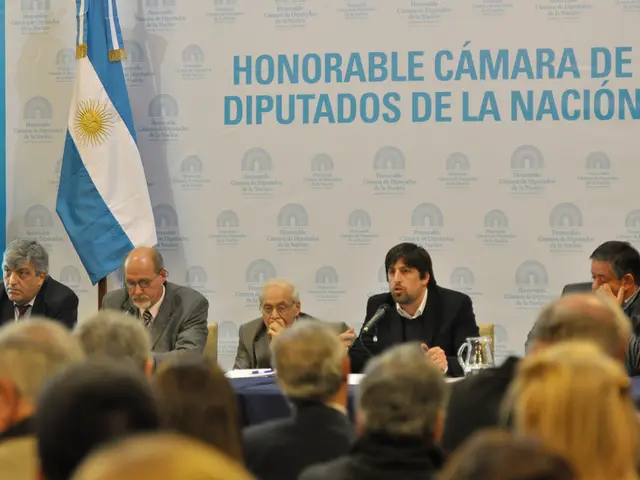Escalating Tensions: How US-China Relationship Deteriorates Beyond Tariff Truce, Affecting Students and Tech Companies
US-China Tensions Escalate over Education, AI, and Rare Earth Minerals
In a recent development, US Secretary of State Marco Rubio has threatened to "aggressively revoke" visas of Chinese students studying in the United States, continuing a destabilizing trend in relations between the world's two largest economies.
This latest move comes despite a brief tariff truce between the US and China, following two days of trade talks in Geneva earlier this month. While reciprocal tariffs were dropped by 115 percentage points for a 90-day period, discussions since then have been limited, and trade talks are reportedly "a bit stalled."
The US-China trade spat began in earnest when the Trump administration raised tariffs on Chinese goods to 145% earlier this year, with total US duties on some Chinese goods reaching an astounding 245%. In response, China imposed 125% tariffs of its own on US goods.
Despite the temporary reprieve, divisions between Washington and Beijing over higher education, artificial intelligence (AI) chips, and rare earth minerals persist. Chinese students currently make up approximately a quarter of all foreign students in the US, with over 270,000 residing in the country during the 2023-2024 academic year.
China's Ministry of Foreign Affairs criticized the decision to revoke visas, stating that it infringes on the rights of Chinese students. In defense of the move, the Trump administration cited its broader immigration agenda, aimed at tightening visa controls.
Separately, the US has taken measures against the Chinese semiconductor industry, issuing guidance to American firms warning against using Huawei's Ascend AI semiconductor chips. These chips are key components in AI systems and have long been a source of tension between the two nations. China's Commerce Ministry spokesperson declined the US's accusations, describing the move as "undermining" the consensus reached in Geneva.
In another blow to US-China relations, the US government has ordered US companies to cease selling their advanced chip software used for semiconductor design to Chinese groups. These actions follow a history of US attempts to tighten export controls on semiconductors, citing concerns about China using US technology for military purposes. However, Chinese officials and industry executives contest these charges, arguing that the US is seeking to impede China's economic and technological development.
Further complicating the situation, China is the world's largest processor of rare earth minerals, which are essential for manufacturing goods in a wide range of industries, including defense, healthcare, and technology. Restrictions on the supply of these minerals provide Beijing with a strategic advantage in future negotiations, as limited supplies of critical technologies can serve as leverage in resolving ongoing trade disputes.
As the 90-day tariff truce nears its end, uncertainty surrounds the future of US-China trade relations, particularly given the ongoing disagreements on various fronts. Although both nations have emphasized the importance of dialogue and mutual respect, concrete progress remains elusive. The temporary nature of the tariff reductions and the exclusion of certain sector-specific tariffs leave the situation tenuous, with key challenges yet to be addressed.
- The US-China relationship continues to deteriorate, extending to politics, as US Secretary of State Marco Rubio threatens to revoke visas of Chinese students studying in the US over education.
- The ongoing US-China trade dispute, sparked earlier this year by tariff increases, has expanded to include issues like artificial intelligence (AI), rare earth minerals, and general news headlines.
- Health and education sectors could potentially be affected by the escalating tensions, with China providing a significant portion of foreign students in the US and being the world's largest processor of rare earth minerals.
- Policies and legislation related to immigration, particularly visa controls, have played a crucial role in the US's recent decisions, as the Trump administration aims to tighten immigration policies.
- Economically, US-China relations are at a critical juncture with ongoing trade talks stalled, tariffs in place, and new restrictions imposed on industries such as semiconductors, potentially affecting the global supply chain for a wide variety of goods.








